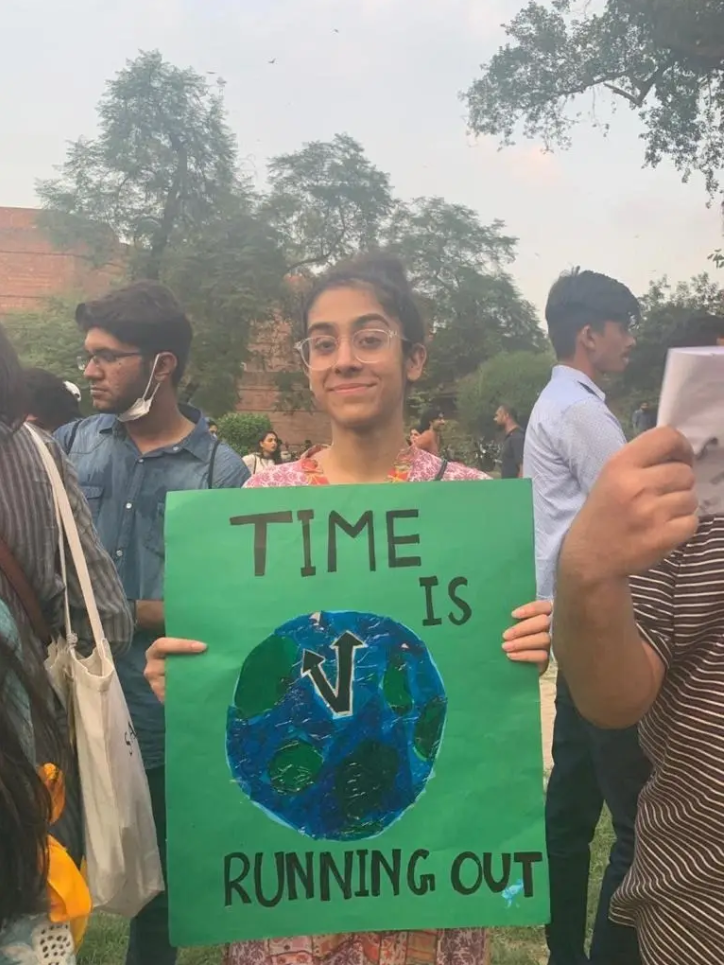Islamabad — Three Pakistani teenagers took the government to court this week for violating their right to life and health by underreporting the severity of air pollution in Lahore, the capital of Pakistan’s populous Punjab province.
Lahore, Pakistan’s second-largest city, is choking on smog, driven in part by smoke from brick kilns and steel mills, burning of rice stubble and garbage, growing numbers of vehicles on the road and large-scale losses of trees as the expanding city makes way for new roads and buildings.
Many in the city of 11 million have complained of headaches and burning eyes and throats as air pollution levels have hit an all-time high. Air quality monitors installed in Lahore’s Gulberg area have recorded Air Quality Index (AQI) levels of 600. Levels of 250 to 300 are considered ‘hazardous’ and require people with heart and lung disease and the elderly and children to remain indoors.
Mishael Hyat, 17, Leila Alam, 13, and Laiba Siddiqi, 18, filed a petition before the Lahore High Court on Tuesday, presenting medical reports from Lahore hospitals and testimonials from doctors and environmental activists to show the discrepancies between research by international organizations and reports by the Punjab’s government on smog conditions in Lahore. The girls are represented by environmental lawyer Ahmad Rafay Alam, Leila’s father.

Three Pakistani teenagers took the government to court this week for violating their right to life and health by underreporting the severity of air pollution in Lahore. (Photo Courtesy: Mishael Hyat)
Speaking to Arab News, lawyer Alam said the court had adjourned the case till next Tuesday — the short date an indication of the priority it was given to the issue — and directed the Government of Punjab and the Environmental Protection Agency, Punjab, to respond to the girls’ complaints.
“If we are successful, the AQI classification system will be regularised and people will know what measures to take in episodes of air pollution,” Alam said.
The main concern of the petition, he said, was that Pakistanis have a true picture of pollution levels.
“We’re not asking the court to shut stuff down,” Alam said. “We’re asking the court to make sure the information being provided to the public is accurate and properly reflects the severity of the air pollution.”
Lahore, once known as the Garden City but now choked with cars, regularly figures on air quality indexes as one of the most polluted cities in the world — and many of the pollutants are also drivers of climate change.
Leila, Hyat, and Siddiqi met at Lahore’s climate change march in September this year and decided to join forces to approach the courts.
“Each has a personal reason why the air quality prevents them from leading normal lives,” Alam said. “All three are impacted differently by air pollution. Mishael is an ace swimmer and it’s impacting her training. Leila and Laiba find it hard to study and concentrate.”
Siddiqi was one of the organizers of the climate march and has been actively involved in climate change activism since 2016.
“After the march, we were all just trying to plan our future course of action and we really wanted to engage with the legislative system and policymakers head-on,” Siddiqi told Arab News “The petition was Rafay’s idea really because he’d been involved in some lawsuits as an environmental lawyer already. And we decided the petitioners would be students who are most impacted by smog.”
The petition includes reports from Lahore’s Children’s Hospital stating that the medical center has seen a threefold increase in admissions presenting chest or cardiovascular complaints in the past decade, as well as discrepancies between what the government has reported on the toxicity of the air versus what World Health Organization (WHO) and other groups have deemed an alarming environmental phenomena.
“The WHO reports that over 95% of children in lower and middle-income countries are exposed to high levels of particulate pollution. Pakistan and Pakistani cities are no exception,” Alam said, adding that the EPA, Punjab, was “underreporting the severity of air pollution.”
An AQI reading of 185 is classified as “Satisfactory” by the EPA, Punjab, but “Unhealthy” by the US EPA, Alam said.
“In other words, people are not properly informed of how bad the air pollution is, and accordingly their response underestimates the severity of impure air,” he added.
Hyat said the girls were pleased to see the LHC chief justice taking an interest in their case. Now, the activists are hoping the government also responds responsibly.
“We hope that the government takes action to give the public up to date information that is in accordance with international standards, and takes measures to reduce emissions from industry, transport and agricultural sectors so that future years can see cleaner air,” Hyat said.












